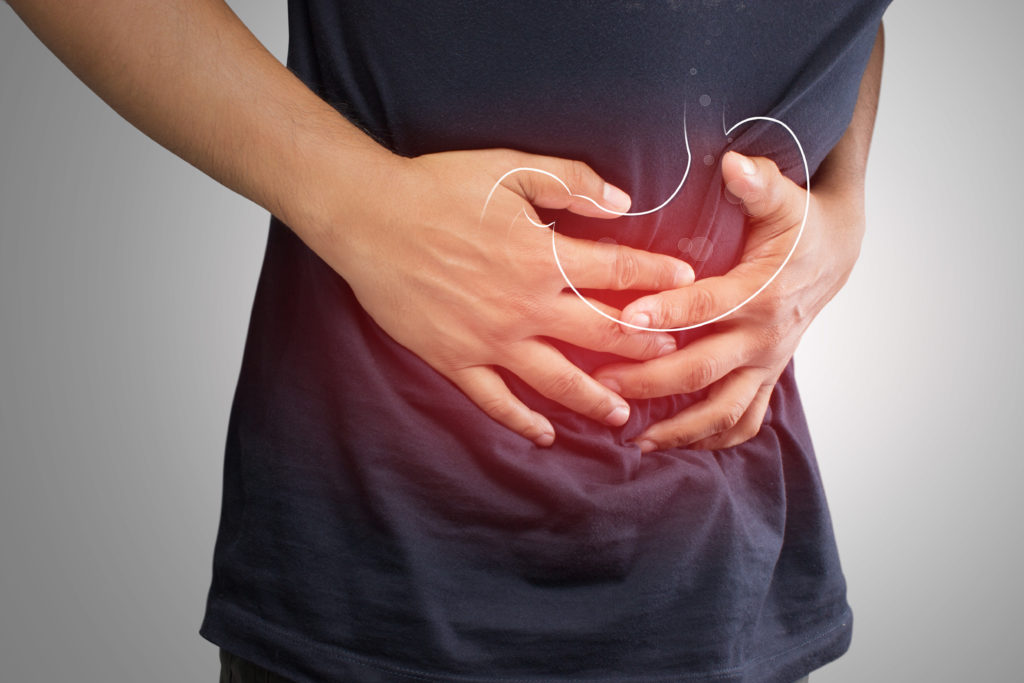February 21, 2023
7 Common Causes of a Burning Sensation in the Stomach
Occasional stomach upset is very common, especially as you get older. Most of the time, a mild case of pain or a burning sensation in the stomach isn’t a cause of concern. Over-the-counter medicines can help with the discomfort.
However, some conditions can cause prolonged symptoms or symptoms that get worse over time. When that happens, you will need to talk to your doctor to get the treatment you need.
Stomach pain and burning can have a variety of causes. Food and medicines can be a culprit, but there are also medical conditions that can lead to stomach pain and other symptoms. Common causes of stomach discomfort include:
Food and medications: Certain foods or medicines can trigger stomach discomfort. You may have undiagnosed sensitivities to certain foods that lead to indigestion and a burning sensation in the stomach. In addition, some popular foods lead to stomach upset, including:1
- Acidic foods like tomatoes or citrus
- Onions and garlic
- Alcohol
- High-fat foods
- Caffeinated drinks like coffee
- Carbonated drinks
- Pain medicines such as aspirin, ibuprofen, naproxen, Celebrex, and Dayopro
Ulcers: Gastric ulcers are sores that develop in the lining of your stomach. They can be caused by a buildup of stomach acids, infection, or as a side effect of some medications. Ulcers cause pain and burning sensations. Most ulcers require prescription medication as treatment.2
 Functional Dyspepsia: Functional dyspepsia is the medical term for indigestion that doesn’t have a clear cause. You may experience occasional discomfort or burning sensation for no apparent reason. You may or may not have other symptoms like gas and bloating. Functional dyspepsia isn’t harmful, but it can be uncomfortable and inconvenient.3
Functional Dyspepsia: Functional dyspepsia is the medical term for indigestion that doesn’t have a clear cause. You may experience occasional discomfort or burning sensation for no apparent reason. You may or may not have other symptoms like gas and bloating. Functional dyspepsia isn’t harmful, but it can be uncomfortable and inconvenient.3
GERD: Gastroesophageal reflux disease or GERD is a condition where stomach acids rise up into the esophagus and cause a burning sensation. You may also notice a sour taste in your throat, regurgitation, a persistent cough, or difficulty swallowing.4
Irritable Bowel Syndrome: Irritable bowel syndrome, also called IBS, is a common, chronic digestive disorder. The cause is unknown. People with IBS experience a stomach burning sensation along with gas, cramps, diarrhea, or constipation.4
Stomach infection: Bacterial infections in the stomach can cause symptoms like burning and pain. Other symptoms of an infection include bloating, increased belching, nausea, decreased appetite, and unexplained weight loss.4
Cancer: Several types of cancer can develop in the stomach, all of which pose serious threats to your health. Stomach cancer usually develops slowly, and symptoms may get worse over time. You may notice pain and burning as well as more serious symptoms including:5
- Feeling full after even small meals
- Abdominal swelling or fluid buildup
- Constant discomfort
- Appetite or weight changes
- Nausea and visiting
- Blood in stool or vomit
- Weakness and fatigue
Home Remedies to Treat Burning Stomach
In many cases, you can reduce stomach burning by avoiding foods that lead to discomfort. Reducing your intake of caffeine, soda, alcohol, or acidic foods can prevent episodes of stomach pain and bloat. You can try cutting back on one type of food at a time to see which makes the biggest difference in how you feel.
You may also benefit from making over-the-counter remedies for mild stomach discomfort. Medicines like Tums, Pepto-Bismol, and Pepcid, or generic versions, can reduce symptoms and help you feel better quickly.6
Some people find adjusting their position during an episode of stomach pain can make a difference. You may be more comfortable if you sit up instead of lying down. Taking small sips of water may also improve symptoms. Be careful not to drink too much and over-fill your stomach. That may make symptoms feel worse.
Preventing Burning Stomach Sensation
You can make lifestyle changes that reduce the risk of having frequent episodes of stomach discomfort. Avoiding foods that upset your stomach is one way to prevent ingestion. In addition, you can try taking steps to improve your overall wellness, including:
- Quitting smoking
- Reducing stress and anxiety
- Maintaining a healthy weight
- Eating smaller meals
- Avoiding eating late at night
- Reducing alcohol consumption
If you take medications that upset your stomach, ask your doctor about alternatives. You may be able to switch to a treatment that doesn’t cause discomfort.
When to See a Doctor for Burning Stomach Sensation
Some causes of a burning stomach sensation can only be resolved by getting medical treatment. You should see a doctor if you notice any of the following symptoms:6
- Shortness of breath

- A feeling of tightness in your chest
- Blood your stool
- Nausea and vomiting
- Difficulty swallowing
- Unexplained weight loss
In addition, you should see your doctor if you have frequent episodes of burning in your stomach, the burning is getting more severe over time, or home care doesn’t help with your symptoms. Your doctor can run tests to determine if you have a condition like ulcers or an infection that requires prescription medication. You may need blood tests to check for infection.
Your doctor may also order imaging tests such as endoscopy. The doctor will insert a tube with a small camera on it into your stomach to look for signs of ulcers, cancer, or infection.
If you have a serious health condition, your doctor will work with you to develop a treatment plan. Conditions such as ulcers or chronic GERD may be managed with precautionary medications such as proton pump inhibitors or H2-receptor antagonists. If an infection is causing your discomfort, you will need an antibiotic. If your doctor suspects cancer, they will refer you to an oncologist who will treat your condition.
Most cases of ingestion or what causes a burning sensation in the stomach are not serious. You can try home care and over-the-counter remedies to feel better in the short term. If you have questions or if your symptoms get worse, call your doctor for help.
References:
- Cleveland Clinic. (January 19, 2023). “”
- National Health Service. (January 14, 2022). “Stomach Ulcers.“
- Mayo Clinic. (December 29, 2022). “Functional Dyspepsia.“
- Medical News Today. (n.d.) “Stomach Burning: What to know.“
- American Cancer Society. (January 22, 2021). “Signs and Symptoms of Stomach Cancer.“
Cleveland Clinic. (December 19, 2022). “Indigestion (Dyspepsia).
DISCLAIMER
The information featured in this site is general in nature. The site provides health information designed to complement your personal health management. It does not provide medical advice or health services and is not meant to replace professional advice or imply coverage of specific clinical services or products. The inclusion of links to other web sites does not imply any endorsement of the material on such websites.